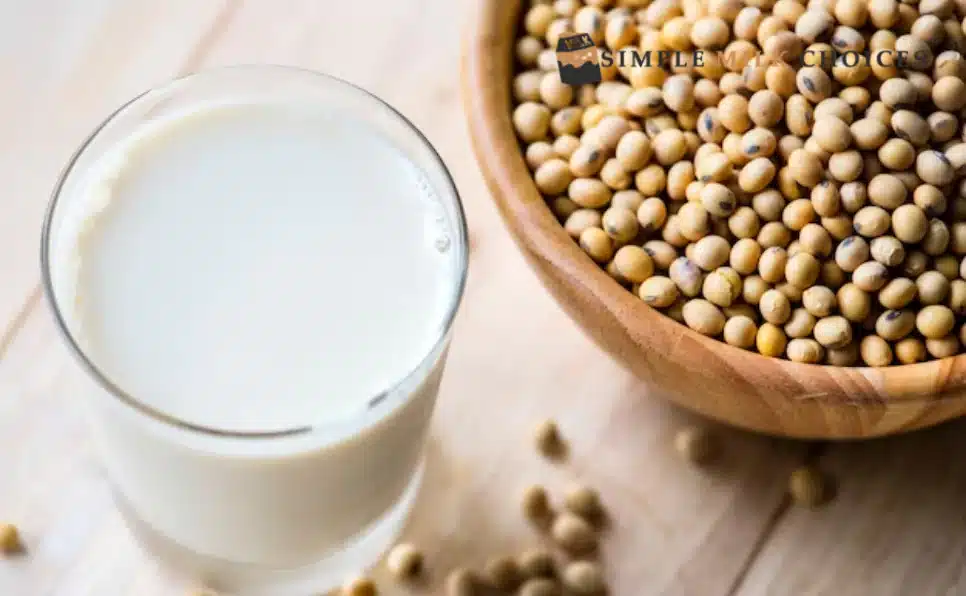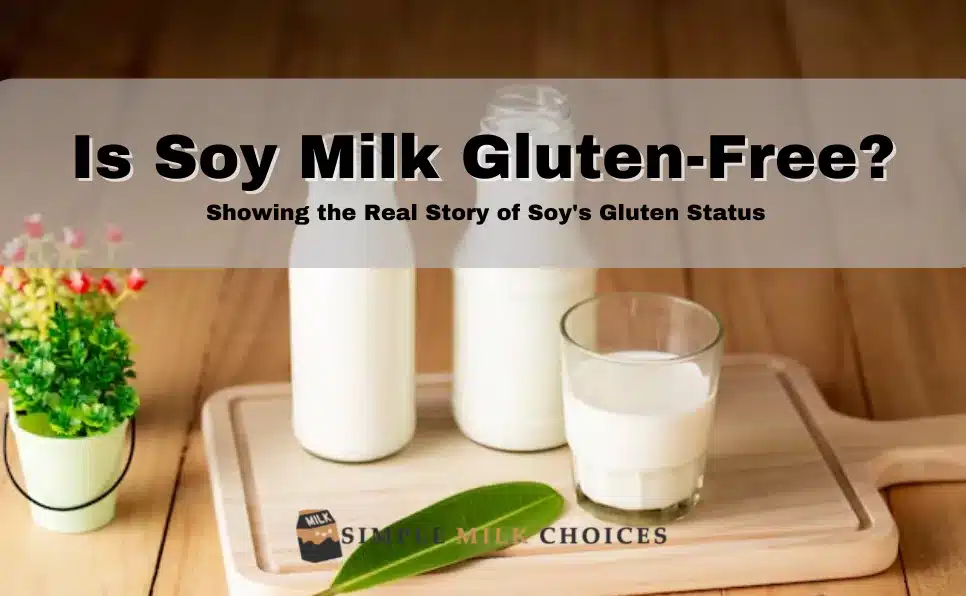Soy milk is a non-dairy alternative produced using soybeans and water. At first, soybeans themselves don’t normally contain gluten, which could lead one to expect that soy milk is consequently without gluten. However, there can be worries about potential gluten contamination during the assembly or handling of soy milk.
Producers could deal with soy milk in offices that handle gluten-containing grains. This cross-contact or cross-defilement could bring gluten particles into soy milk inadvertently. Regardless of whether soy milk doesn’t contain gluten in its unique ingredients, this unintentional pollution during creation turns into a basic thought for those requiring a strict gluten diet.
For people with gluten-related conditions, for example, celiac infection or gluten awareness, even minuscule measures of gluten can set off unfriendly responses. Thus, it’s crucial for them to distinguish and consume items named “without gluten” or confirmed in that capacity.
Certificates and names assume a critical role here. Some soy milk brands could intentionally go through testing and get affirmations to ensure their items satisfy the guidelines of being gluten-free. This assurance becomes paramount, especially for those interested in exploring the soy milk flavor profile. People who are looking for gluten-free alternatives will feel more at ease when they see these certifications.
In this way, when we explore whether soy milk is without gluten, it’s about its essential ingredients as well as about the handling, taking care of, and accreditations that decide its security for those with gluten-related concerns. Hence, for people on a gluten-free diet, picking ensured sans-gluten soy milk turns into an essential thought to limit the risk of gluten exposure.
What is Gluten and Gluten Awareness?
What is Gluten?
Gluten resembles an exceptional ingredient tracked down in specific food sources. This kind of protein is normally present in grains like wheat, corn, and rye. This protein is a paste, giving bread and other heated products their stretchy and chewy texture.
Gluten Awareness
Gluten awareness is the point at which somebody’s body disagrees with gluten. Certain people might feel awkward or unwell after eating food varieties that contain gluten. It’s unique to sensitivity or an extreme condition called celiac illness; however, it can in any case create some issues.
What Gluten Responsiveness Means for Health?
At the point when somebody with gluten responsiveness eats gluten-containing food sources, it could cause different issues. They may experience stomach pain, bloating, or gas. Occasionally, it can prompt sleepiness, migraines, or even skin issues.
Importance of Gluten-Free Diets
For people sensitive to gluten, steering clear of gluten-containing food items is crucial. This means avoiding things like bread, pasta, some cereals, and, surprisingly, certain sauces or processed foods that could contain hidden gluten. Additionally, opting for the most usable soy milk can also be beneficial for individuals with gluten sensitivities, as it serves as a gluten-free alternative to dairy milk in various recipes.
In simple terms:
Gluten resembles an exceptional protein in certain grains that can cause specific people to feel unwell. Those people could have to stay away from food sources with gluten to remain sound and avoid inconvenience.
Exploring Soy Milk
What Exactly is Soy Milk?
Soybeans, found in many regions of the planet, produce soy milk, a plant-based drink. Soybeans soak, grind, and then soak in water to make soy milk. Stress the subsequent fluid to create a smooth, milk-like beverage.
Nutritional Content of Soy Milk
People know soy milk as a healthier choice than cow’s milk. It’s rich in nutrients like protein, which is significant for muscle health, and it contains essential nutrients and minerals like calcium, vitamin D, and B nutrients. These nutrients assist with supporting bone health, reinforce the resistant immune system and aid in overall health.
Common Uses of Soy Milk in Diets
People use soy milk in numerous ways. Some beverage it as a drink, very much like cow’s milk. Others use it in cooking and baking as a substitute for dairy milk. It may be utilized well in recipes for hotcakes, biscuits, and smoothies, and the sky is the limit from there. It’s also a well-known decision to make without dairy yogurt, cheddar, or frozen yogurt. People pick soy milk not just because it’s a delicious choice of cow’s milk but also because it suits different dietary requirements, particularly for people who are lactose-intolerant or follow a veggie-lover diet.
Soy milk comes in various flavors, like plain, improved, or unsweetened, so people can pick the one that best accommodates their taste inclinations. Generally speaking, it’s a flexible and nutritious choice for those hoping to switch to a non-dairy alternative, offering the added advantage of a longer storage lifespan compared to fresh dairy products.

Understanding of the Gluten in Soy Milk Fantasy
Understanding Gluten-Free
Explanation:
Gluten resembles something minuscule tracked down in wheat, grain, and rye that can create issues for certain people’s stomachs.
Why People Worry:
A few people think soy milk could have gluten, which could make it terrible for people who can’t have gluten.
Is Soy Milk Normally Without Gluten?
What You Want to Be Aware of:
Soy milk itself doesn’t normally have gluten in it since it comes from soybeans, not wheat or other gluten things.
The Genuine Concern:
In some cases, when they make soy milk in large production lines, it could contact things with gluten or be made in places with gluten, which could blend a little gluten into the soy milk.
Checking for Gluten in Soy Milk
Searching for Signs:
There are extraordinary names or stamps on soy milk bundles that say “without gluten.” That implies the organization checked to ensure there was no gluten in the soy milk.
Being Extra Cautious:
A few organizations are cautious and have exceptional guidelines to keep their soy milk free of gluten. These brands may be better for people who truly can’t have gluten.
Alternatives to Soy Milk for Gluten-Free Diets
Almond Milk
Ground almonds and water blend to create the well-known almond milk, a gluten-free alternative. Its subtle nuttiness complements its low-calorie content. This, combined with its abundance of vitamin E, makes it an enticingly nutritious choice for those seeking a lighter alternative. For additional hydration benefits, consider opting for hydrated almond milk, which maintains the same nutritional advantages while providing added hydration.
Oat Milk
Oat milk is produced using oats and water, giving it a smooth texture and an unobtrusive oat flavor. Usually gluten-free, but some brands might contact gluten during processing, so choosing certified gluten-free options is important.
Coconut Milk
Coconut milk is produced using the tissue of coconuts and water. It has an exceptional tropical flavor and is normally free of gluten. It’s rich in flavorful fats and can add a velvety touch to dishes and refreshments.
Rice Milk
Rice milk, a product made from processed rice and water, is known for its mild taste and gluten-free nature. People with various food sensitivities often opt for it due to its allergy-friendly properties, making rice milk a popular choice for those seeking gentle alternatives.
Hemp Milk
Hemp milk is produced using hemp seeds and water. It tastes nutty and is rich in omega-3 unsaturated fats. Hemp milk is normally without gluten and offers a decent source of plant-based protein.
These milk choices are reasonable for those following gluten-free diets. You can use them in cooking, baking, cereal, and coffee, or enjoy them on their own. Checking names is crucial to ensuring they don’t have gluten, especially for oat milk. Cross-contamination during processing might leave traces of gluten in a brand. Each milk alternative offers a unique taste and nutritional benefits. They provide choices for individuals seeking to avoid gluten and dairy in their diet.

Simple Considerations for Consumers of Gluten-Free Soy Milk
Understanding Without Gluten Names
Simple Clarification:
When you take a gander at the name of a food item like soy milk, “sans gluten” signifies it has no gluten, which is a protein that can be harmful to certain people’s health.
Tip:
Search for marks that explicitly say “sans gluten” to ensure the soy milk you’re buying is right for people who can’t have gluten.
Possible Benefits and Dangers
Simple Thoughts:
A few people feel improved when they stay away from gluten, while others probably won’t see a lot of contrast in the way they feel.
Tip:
Evaluate non-gluten soy milk and perceive how it affects you. Assuming it functions admirably for yourself as well as making your belly feel better, that is great!
Settling on Brilliant Decisions for a Gluten-Free Way of Life
Plain Talk:
Assuming you’re somebody who needs to stay away from gluten and needs to drink soy milk, it’s essential to pick marks that are alright for you.
Tip:
Ensure the soy milk packaging labels it as ‘gluten-free.’ Monitor for any gluten-containing ingredients for safety.
Conclusion
Soy milk is typically gluten-free. Its primary ingredients do not include gluten. However, there may be a risk of gluten pollution during the assembly process. Searching for labels or certificates that confirm soy milk’s gluten-free status is crucial to ensuring it’s safe for a gluten-free diet. It’s essential to verify that soy milk meets gluten-free standards.
Soy milk can be a good dairy alternative for some people, especially those with gluten sensitivity or celiac disease. Choosing gluten-free soy milk is crucial to minimizing the risk of gluten exposure.
Remember, consulting a healthcare professional or a registered dietitian is wise if you have concerns or specific dietary needs. They can guide you to make the best choices for your health and well-being.





